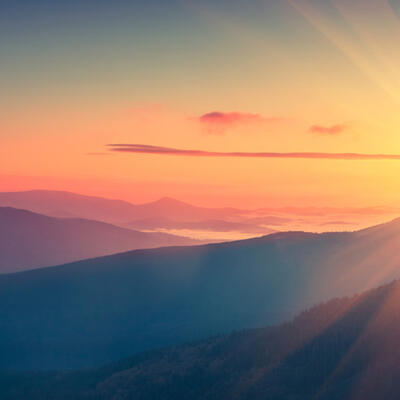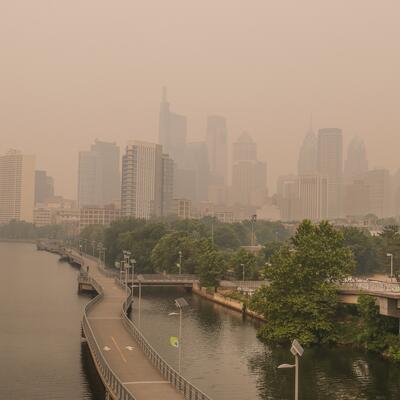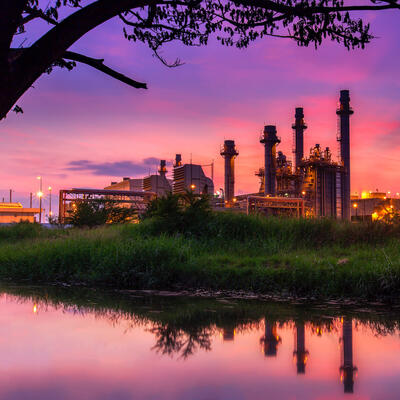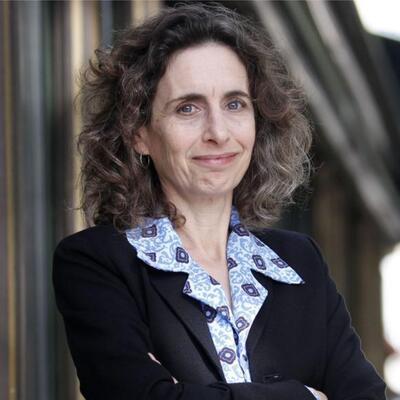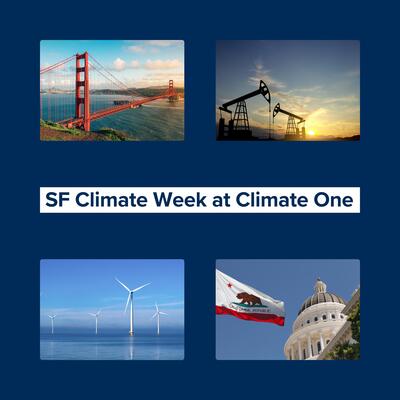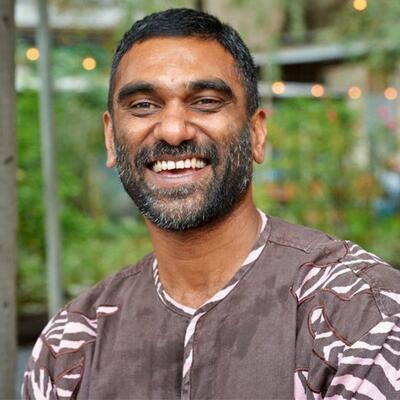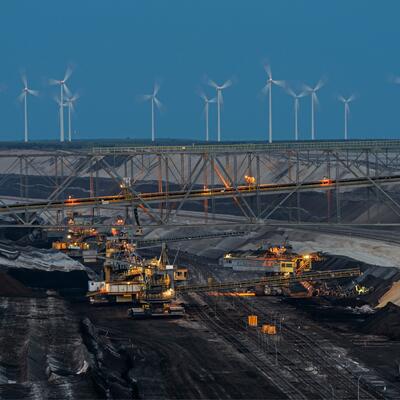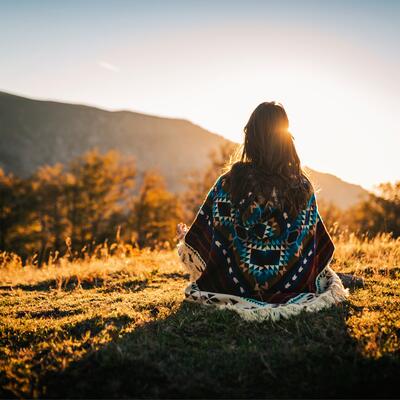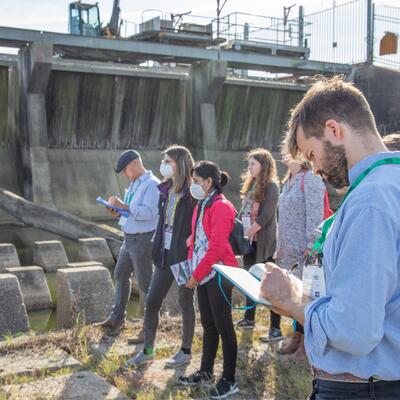
Putting It All on the Line with Rev. Lennox Yearwood, Jr. and Jacqueline Patterson
Guests
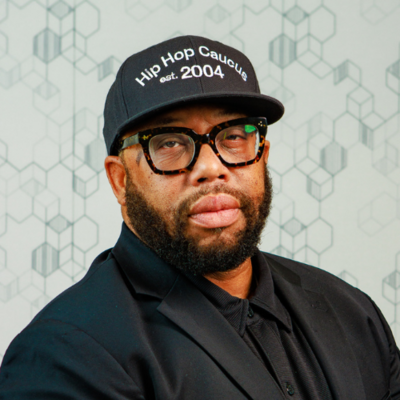
Rev. Lennox Yearwood Jr.
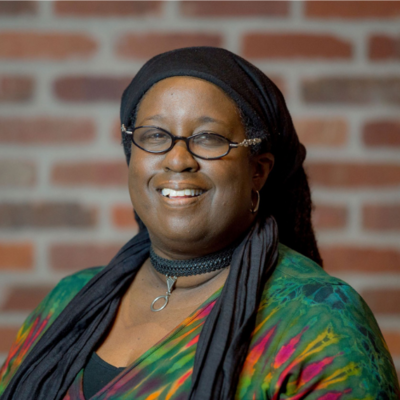
Jacqueline Patterson
Summary
Climate affects everyone, but not equally. Those affected first and worst are often the same communities that suffer from housing and income inequality, and climate and societal injustice. Rev. Lennox Yearwood, Jr. has made striving for social, economic and climate justice his lifelong pursuit.
Yearwood says his organization, Hip Hop Caucus, was especially galvanized after Hurricane Katrina. One of his friends stayed behind to help and ended up catching her elderly neighbors as they floated down the street in the floodwaters, getting them to safety partly by first tying them to a tree in her front yard.
“And that, for me, is why we do this work. Because no one, and I mean no one, should have to catch their neighbors floating down the street,” he says. “Since that time, [Hip Hop Caucus has] been working to stop, literally, anywhere, black or white, Republican or Democrat, neighbors from floating down the street.”
A charismatic leader, Rev. Yearwood embraces his role as a unifying force, working with front-line climate activists and billionaire politicians alike.
“We realize no cash, no cause. You need resources to make this happen,” he says of his work with Michael Bloomberg. “David needs some stones. Cause we definitely fighting some Goliaths. So if Mr. Bloomberg can provide the resources for a few folks on the frontline and fenceline communities have a few stones in their slingshot, then we're all for that.”
Jacqueline Patterson is former Senior Director of the NAACP Environmental and Climate Justice Program. She’s also the founder and executive director of The Chisholm Legacy Project, a group that supports Black frontline climate leaders. Like Rev. Yearwood, she’s seen too many friends and relations die from exposure to industrial pollution. That’s one reason why she says a just transition needs to be driven by those on the ground.
“I think that getting behind community leadership is important. Whether it's Bloomberg Philanthropies itself, or it is the big green organizations, the places [with] the best enduring success was where communities were in the lead. The investment needs to be, and the power needs to be, with the frontline communities,” Patterson says.
Rev. Yearwood finds solace and comfort in his deep religious faith, which helps him stay motivated and compassionate amidst so much difficult work. And while he acknowledges the personal risks of putting himself on the line for climate and other kinds of justice, he says it’s worth it.
“I am more than willing to give my life to this cause because there's a righteous cause,” he says. “And I know that without clean air and clean water, the next humans don't succeed.”
"I have to have the courage to stand up to those who know that it's time to stop polluting our communities, polluting our world. We don't have much time and we must end the climate crisis now."
Episode Highlights
2:10 Galvanizing power of Hurricane Katrina for climate activism
9:00 Breaking down silos to bring people together
10:00 Working with billionaire Michael Bloomberg
15:00 What he’s personally willing to give to the cause
17:45 Role of faith in his work
19:30 Climate as culture and power of storytelling
27:30 Forgiveness for fossil fuel companies and workers
34:00 Jacqui Patterson on childhood pollution exposure
38:00 Manipulation tactics of fossil fuel industry
44:00 Just transition needs to be defined and led by local community
48:30 Rating the Biden/Harris administration on climate justice
Resources from this Episode (4)
Full Transcript
Note: Transcripts are generated using a combination of automated software and human transcribers and may contain errors. Please check the actual audio before quoting it.
Greg Dalton: I’m Greg Dalton.
Ariana Brocious: I’m Ariana Brocious.
Greg Dalton: And this is Climate One. Our show is all about having empowering conversations, and today we have a really good one.
Ariana Brocious: We don't usually think of climate and culture together, right?
Greg Dalton: We think about economics, science, curves, and outer space, maybe engineering, steel and concrete, maybe cows and hamburgers.
Ariana Brocious: But there's a group using the tools of arts and culture to do some pretty amazing things. It's called Hip Hop Caucus. They organize people around civil rights, environmental justice and democracy. And they do that by making films, a great podcast… They even host comedy shows, like one called Ain't Your Mama's Heat Wave. Here’s comedian Mamoudou N’Diaye.
Mamoudou N’Diaye: I want to tell you, just a report from these White climate crisis rooms, what they worry about: straws, sea turtles… and Black people. It’s not a good order.
Greg Dalton: The leader of Hip Hop Caucus is Reverend Lennox Yearwood, and I've been excited to talk with him for a long time. He grew up in Louisiana. He's the son of academics and activists, went to a historically Black university in Washington, D. C. He has a really compelling way of rallying people from different walks of life. He's a unifier. He hangs out with billionaires and front line climate activists.
Ariana Brocious: Yeah, so after following his career and work for a while, what was it like to meet him?
Greg Dalton: I was really captured by his calm presence. Clearly, he's a man of deep faith. He's a Christian, and I also got some Buddhist vibes from him. You know, I wrestle with acceptance and resignation around climate. Am I doing enough? A lot of people in climate are worrying, am I doing enough? I think he really has a very calm way of accepting the limits of his power and what he can control while he's confronting deep, systemic, powerful people and institutions.
Ariana Brocious: So without further ado, let's hear Reverend Lennox Yearwood.
Greg Dalton: How did Hurricane Katrina impact you personally and shape your activism?
Rev. Yearwood Jr.: Hurricane Katrina impacted me personally because I had a lot of friends in New Orleans and seeing them, well I think anybody, seeing anybody drown and suffer, I don't care if you knew them or not, it's going to impact you, but for me personally knowing those communities, knowing folks in the 7th Ward and the 9th Ward and then seeing the pictures and seeing where the water was, clearly, you realize that if the water was that high, that you, people could not survive that. And so for me, I was in Washington, D.C. when Hurricane Katrina hit, but it was really the aftermath. It was really just sitting there waiting, like many people, watching, waiting. And then you just realize that, wow, there are just so many people who are literally dying before our eyes on TV. And something must be done about this. And that was when I guess we sprang into action at Hip Hop Caucus. We immediately had our networks together from the past election cycle, and people were being bused all around the country. So because of those networks, people were able to then connect with people. And then we just went right to work, and we haven't stopped since.
Greg Dalton: And before that you had been instrumental in P. Diddy's Vote or Die campaign leading up to the ‘04 election. and you've been involved in the Hip Hop Summit Action around that time. It sounds like your activism was focused in other areas and Katrina really kind of brought you into fossil fuels and climate. Is that fair?
Rev. Yearwood Jr.: Somewhat. I mean, Dr. Ben Chavis was working with me at the Hip Hop Summit Action Network, and he coined the phrase environmental racism. And so he would add that to all our literature when we were doing our voting work in 2003 and 2004. So I wasn't as, you know, up to speed as I am now. But it was clear that he was passionate and he would talk about what had happened in Warren County, in North Carolina, which is the birthplace of the environmental justice movement. And he would talk about how people would put toxins in certain communities. And so, you know, we always thought that was, it was important, but it was someone else's issue. We had other issues at that time, from the Rockefeller drug laws to police brutality to poverty, you know, we were like, okay, well, this is important.
But when Katrina hit, it crystallized, I think, for our generation how important that was. And for me, personally, I mean, I had a good friend who lived on Derjewan Street, Mama D. An amazing, beautiful, Black woman with these long, gray dreadlocks, and she lived on Derjewan Street.
Pretty middle class community, but a community that was built on the backs of Black people fighting for, just dignity. And why I bring her up now is because when she stayed home, she didn't leave like many people could have, she could have left, but she stayed home and her neighbors, mostly older Black citizens who had to ride on the back of the bus and drink from the segregated water fountains. She stayed around, you know, she was in her own sixties and seventies at the time. And as her neighbors, grandmothers and grandfathers begin to float down the street, she would go out there and catch them and tie them to the tree in front of her house.
Greg Dalton: Hmm.
Rev. Yearwood Jr.: And that, for me, is why we do this work. Because no one, and I mean no one, should have to catch their neighbors floating down the street and tie them to a tree. And so for me, since that time, we, Hip Hop Caucus, created the Gulf Coast Renewal Campaign and have been working to stop, literally, anywhere, black or white, Republican or Democrat, neighbors from floating down the street.
Greg Dalton: And we see great outpourings of care and kindness. And I hear the injustice that you're talking about there. And I think of the Cajun Navy, which springs into action and, you know, carrying grandmas off, people they don't know, on their shoulders into the boat. You know, that stays with me all the time. And we seem to have this great, care for our neighbors at those times. And then we go back to... normal times, and we don't seem to care for our neighbors as much.
Rev. Yearwood Jr.: Well, I'm not sure we don't. I think politicians don't. I mean, we, I think, I think, let's be clear. I think that, I think we still care for our neighbors. And I've seen that recently in East Palestine, Ohio. And I've seen this, those folks coming together. I've seen it all around in different places before and after tragedy. So I think politicians have a short memory, which is part of our work too, that we have to get them to understand that we need policy to create long lasting change because either you shape policy or policy shapes you. For too long, these politicians have these short memories about the impacts of these disasters.
Greg Dalton: You say that most people of color are forced into white progressive platforms. You came from hip hop into the environmental movement, which is known as being coastal, elite, white. What's been your experience in that regard?
Rev. Yearwood Jr.: Well, for me, I think that I've become kind of like a little bit of a Moses a little bit, right? I think that I didn't come up, even though when I after our work with Katrina and our continued work around different issues from Stopping the KXL pipeline and stopping the Atlantic Coast pipeline, to stopping the Byhalia pipeline in Memphis, we've been fighting pipelines all across and winning, we'd be very clear we've been winning as well, um, across the country for the past now, 15, 16 years. I think for me, the reason for that, though, I didn't come up. And no, no shade, as we were say in hip hop, I didn't come up in the traditional white,progressive climate movement. And I think that's a benefit because I think that I always saw this issue as an issue that impacted my community. And I think other folks do too, but they have to then work through institutions that may not be aligned to their community, where for me, it's hip hop caucus and other organizations like the Deep South Center and We Act For Justice and Uprose. And I can go on and on and on black millennials for Flint. These organizations are steeped and understanding what it means to be accountable and measurable to your community. And that's where I sit. And then also I think that the progressive climate movement is also a siloed progressive climate movement. People say that's kind of an oxymoron there, Rev. But that's exactly what we have, unfortunately, is that we have a movement that puts people into buckets. They say, okay, if you're environmental justice, okay, well then go over here. That's where the Black, brown, and Indigenous people go. If you're a young person, then go over here with Greta Thunberg and other groups like that, and y'all stand over here. If you're from Appalachia over here, you're from the Arctic over there, and that is ridiculous because the entity that we're trying to stop and curtail the fossil fuel industry is not in buckets. They are not siloed. And so I'm not sure why we ever thought a siloed, segregated climate movement would be successful, but it's not. And so I think that for me, I am in essence, a silo breaker. And so I, I work to break those silos to bring us together so we can be successful.
Greg Dalton: Right. And one way that you're doing that you're working with Michael Bloomberg,
Rev. Yearwood Jr.: That's a silo breaker.
Greg Dalton: Right. In a way, you know, Bloomberg has had a certain orientation towards markets. He's a white male billionaire, I think he's evolved. You know, I'm interested in how you came together and what you're doing together with Mike Bloomberg.
Rev. Yearwood Jr.: Yeah. Well, they were a funder of the hip hop caucus, Bloomberg, Philanthropies. And we were doing work around connecting the dots between culture and climate, which the caucus does really well. And, we were working together. And then Anthea Williams, who we both actually serve on a board together, and I would show up to a number of things and, and over time, one good thing about the Mayor Mike Bloomberg is that he looks for the best people. That's kind of his trademark. And the other thing that he looked for is that his biggest joy, I think, from being mayor was that the life expectancy of people who were living before and then afterward he left mayor was longer. And we shared that passion because we both believe that anybody on this planet should have a long life. And, and so I think that brought us together. We're very different. And there's maybe kind of like an odd couple. It’s gonna be kind of an old reference. People may not know that younger folks. So it's kind of an odd couple and we both share passion. And I want to say that's very important. Do we have the same ideas and visions? No, without a doubt. We are very different. He's from Boston. I am from Louisiana. He is from one world. I am from another world. But we share that we are from the same world. And in that same world, we want to make humanity better. And so, yeah, he brought me in. and I kind of brought him in too. And we both worked together. to our best ability to make this world better. And I think we're doing it. I think that, you know, he's making tremendous investments, to curtail, particularly things around petrochemicals and oil and gas. He's working with mayors and there's so many different things. And so, and that also helps me because I think that there's worlds that I probably wouldn't have been around. And, and I think that helps me also to broaden, to bring that back to my community as well.
Greg Dalton: Because a lot of people who are involved in climate, particularly in the climate justice and environmental justice communities are skeptical of white male billionaires, a white savior complex that Mike Bloomberg, Richard Branson, Bill Gates are going to come somehow save us and they're creatures of this kind of turbocharged capitalism and, you know, symbols of the concentration of wealth. And some people look to those guys and say, well, they're not part of the solution.
Rev. Yearwood Jr.: And that's where I think maybe where we differ because from my community, we realize no cash, no cause. You need resources to make this happen. So we don't, we don't have as many billionaires fighting the good fight, you know, and so we, I guess me from where we come from, the more that we can find a billionaire, white, black, polka dot. We will take ‘em and use those resources. We said we, you know, David needs some, some stones. Cause we definitely fighting some Goliath. So if, Mr. Bloomberg can provide the resources for a few folks on the frontline and fenceline communities have a few stones in their slingshot, then we're all for that. I understand though, I'm going to be very clear. I understand what white supremacy is. I'm very clear on white privilege is, but I'm also very clear that we are in a crisis and we're in a crisis that can literally have extinction level type events. And because of that, that means that we have to work together.
Greg Dalton: You're a pragmatist because of the situation, we don't have time to, to be too pure. You talk about going up against Goliath, David needs stones. You're wearing a hat right now as we record this that says end fossil fuels now. You're taking on very powerful interests, who have a lot to defend, a lot to lose. Do you ever worry about personal safety or, or taking on such power?
Rev. Yearwood Jr.: You have to, but you also have to keep moving. One of the reasons I said that Mama D story and catching your neighbors is because I realized that I need to do all I can with this life force that I have to create a better place for the next generation of humans. And I'm going to do that. And I would love like anybody to live for a long time and I have children and I have a family and I have friends and so no doubt about it. I would love to be here in old age. but if someone feels that I am in the way they need to harm me, my goal is just that the next one will pick up the baton and run very far with it so that we can have clean air and clean water. That's, that's, that's the calling sometimes that you have as an activist. You have to make that. And that's where faith comes in, for me. You know, you have to have a strong faith. To believe that it's just not you. That it's something bigger than you. And that's something that will carry on this fight. And that one day, and at this time, my goodness, with all that's going on and so much pain and so much trauma and so much hurt, you just got to believe that one day, the more that we keep fighting for justice, one day as humans, we will come together and we will make this planet a good place.
Greg Dalton: Are you saying you're willing to give your life to this cause?
Rev. Yearwood Jr.: I am more than willing to give my life to this cause because there's a righteous cause and there's a cause we're fighting for. And I know that without clean air and clean water, the next humans don't succeed. And so at some point in time, this is a temporal state regardless. And you know, I'm not going to be here forever.
So because of that, I'm okay with that. To know that the next generation, the same way, the exact same way that there were those who were on the plantations. There were those who were on the slave boats, there were those who were on the underground railroad, and they gave their lives so that a little black boy from Louisiana can work with a former Jewish mayor from New York to make the world better. Listen, I'm not doing underground railroad. I don't have that, but I have to have the courage to stand up to those to know that it's time to stop polluting our communities, polluting our world. We don't have much time and we must end the climate crisis now.
Ariana Brocious: That’s Reverend Yearwood of Hip Hop Caucus. Please help us get people talking more about climate by giving us a rating or review. You can do it right now on your device. You can also help by sending a link to this episode to a friend.
Greg Dalton: Coming up, how approaching climate as culture can get more people involved:
Rev. Yearwood Jr.: I think the movement doesn't understand that. I think they just want to create the deep end of the pool, but you need to create the shallow end so folks can come in and learn. And I think that's what the Hip Hop Caucus is doing.
Greg Dalton: That’s up next, when Climate One continues.
Ariana Brocious: This is Climate One. I’m Ariana Brocious and today on the show: climate as culture. My co-host Greg Dalton talked with the leader of Hip Hop Caucus, Rev. Lennox Yearwood, whose faith is foundational to his work.
Rev. Yearwood Jr.: Yeah, my faith is very important. My faith actually keeps me because this, this work can be lonely, actually. It actually, you know, can be very lonely. So your faith helps you in that regard. And I tell young people all the time, you know, they, they sometimes may not go to some of the more traditional institutions that we've had, but they have a very strong faith. And I tell them all the time, regardless of where they come from, you have to do this work. You have to believe in something outside of yourself, because if not... You're going to pull on yourself, you're going to think that you have to be the solution and you have to make things right and you have to make sure that, you know, we, we win. And when you get to that level, it becomes consuming and
Greg Dalton: Mm hmm. Mm hmm.
Rev. Yearwood Jr.: And you can't, you can't work that way because then you're not open anymore. Love is what conquers all. And so that's the thing for me. Simply is that you have to have faith. And so for me, faith is critical. this something that you believe is beauty and, and, and, and something you adore, whatever that is, but you have that something outside yourself that you pull on so that you don't consume yourself. Because if you don't, then the rage, the anger, the bitterness will actually consume you.
Greg Dalton: We live in a culture that has been shaped by capitalism that trains and conditions us as consumers that we're out for ourselves. It's what I buy, what I do, how I look, how and then climate, how I act, my personal climate footprints, you know, and that can be. totally consuming. I have virtue fatigue thinking about every little decision I make. What do I eat? What do I buy? And you're right. It can really be consuming. So earlier, you mentioned the hip hop caucus addressing climate and culture. I'm interested in your thoughts about climate as a cultural issue.
Rev. Yearwood Jr.: Yeah, climate is a culture issue, and we have to be better storytellers. I think that's the next, the next frontier in this movement. I think that production is the next form of demonstration. I have nothing against marching in the street. I think it's important. I do it all the time. I have nothing against civil disobedience.
Definitely when it’s peaceful. I think that's important. to bring awareness. But I do think that at this moment, as folks are connected to their phones and radio and TVs, I do think that storytelling is everything. And I do think we need to do better at that. I think we must use our cultural expression. To shape our political experience. And so I think that using culture to do that is, is, is important. So Hip Hop Caucus is, is leading now on the way to other groups like Good Energy and others who are working with folks in Hollywood. But Hip Hop Caucus is leading on that front, creating stories from short films and music, the home album called Heal Our Mother Earth with Common and Neo and Antonique Smith, I mean, there's so much good stuff as well as comedies, I think, and using comedy, Ain't Your Mama's Heat Wave, I mean, just doing so much to really broaden the movement. I think the other thing here is that there's a need that the other side, so to speak, wants to keep it just to one group of people who are preaching to the choir. And so the way that you, you break that is that you have to get. everybody engaged and everyone involved and to broaden your camp, so to speak. And so storytelling helps that because then people can listen at their own accord, their own time and be involved. And so I think that's what we're doing at Hip Hop Caucus. We're trying to be the best storytellers possible. Cause another thing too, no offense to my science friends, I love dearly, I love my scientist friends, but my goodness, they, they can, they can help you gloss over, man. I mean, it can be tough going. I mean, I mean, I love to read an IPCC report. No, like, no, like no other, but man, and it's like, whoo. So we need a little help on that. And we need those who have that gift of storytelling and I think the folks in the Hip Hop Caucus do that really well. And I'm actually very happy that more people are getting behind that and are understanding how important it is to literally just tell the story correctly.
Greg Dalton: Right and that story so often has been what can I buy? Do I eat meat or not? Do I buy an EV or not? Do I buy solar? It's then again, back to that consumer identity, which leaves a lot of people out. It's a very, very narrow pathway for participation versus who am I you know, music, I guess you're saying culture, et cetera, what are the ways in to care about–
Rev. Yearwood Jr.: How fast those EV, how fast those EV goes. I mean, I mean, there's different ways of telling the same story. I mean, if one person is saying that, Hey, you can plug in and save the planet. And that's a great story. And we need that story. Other story could be like, man, this EV is super dope and it goes really fast and it's a lot of fun to drive that may turn different people on. Sometimes, you know, you gotta make things a little sexy, right? I mean, that's what's important also. I think that, I think people need to see this differently. And that's why I think culture is so important, food and fashion. And how we view things. And also, I think the movement had a tendency to only create the deep end. And that's, this is one of my things where everybody has to go to the highest diving board and leap off into the pool, into, you know, 15 foot water. The pool, though, should have two ends. It should have the deep end, which is important, but it should also have this shallow end where the babies can get in and in their little diapers and they can play around in the water. And that's the same pool, the same water, but it allows for everybody, the babies on one side, but also those who want to dive off the deep board on the other side to be all in the same pool. I think the movement doesn't understand that. I think they just want to create the deep end of the pool, but you need to create the shallow end so folks can come in and learn. And I think that's what the Hip Hop Caucus is doing. They're creating a pool, the same water, same pool, same thing, but it allows for different people at different levels to feel comfortable and be in the pool at the same time.
Greg Dalton: Right. Sometimes I'll be out at a dinner with friends and, and they're conscious about what they order in front of me because they think I'm going to judge them. Greg's here, so I'm not going to eat fish because, you know, he's one of those climate guys. He's going to think I'm a bad person if I do this, and there's so much judgment that prevents people from getting involved in the climate conversation, climate activity, because they think they have to be pure to enter the temple and be, you know, vegan, da da da, all these sorts of things, and it keeps people out. And so it seems you have a real gift for bringing people in because it doesn't sound like you judge them. You welcome all to your temple.
Rev. Yearwood Jr.: Most definitely. I mean, I think that's the key. I think we have to have that. To do this, we're going to need industry. We can't fight all the time. We're gonna just batter each other. So the hope is that they realize that now, particularly with the bipartisan infrastructure law and the inflation reduction act, that there's real opportunity because they want to make money. I get it. What you want to do. There's real opportunity for you to make money. And so, and so for you to shift from one to the next, and so I am actually hopeful that they take up that task, and they realize that, you know, creating Cancer Alley, which is in my backyard in Louisiana, or creating, Sacrifice Zones, which may be from Flint to Jackson to Houston, that's not right.Their business plan can't be a death sentence for other people's communities. And so I'm hopeful, even for industry, that they understand that, that we all have to do this thing together, that we are in a crisis and we have to come together, but that's the thing. I don't know if they understand that. Well, unfortunately they're so, some of them are so wedded to greed, that we will need to force some to stop what they're doing. That is just the reality that some of them are not going to stop. And they're not, and they have shown that, they've shown that they will lie. Like, you know, there's a whole thing with Exxon, Exxon Knew and Exxon Lied and Chevron and BP, and now they're being sued by attorney generals all over the country because of these lies that caused so much pain and harm. But there's still hope because we still, to get over the finish line, we're going to need them to come around.
Greg Dalton: And that's, but they're playing by the rules of the game, right? I mean, the rules of the game are that corporations serve shareholders, maximize profit, and they can get sued if they don't do that. So the individuals, now, maybe they created the rules of that game, but the individuals are playing in a system that prioritizes profit over people.
Rev. Yearwood Jr.: Well, and that's why other ways of mechanisms that people are doing in the movement is important. They are doing shareholder strategies. You know, we've seen that with Exxon, folks are creating that. There are folks who are now going right to the banks. You know, me and my dear friend, Bill McKibben, have been talking to many banks, from Citibank to Chase Bank and telling them to stop funding these folks, because that's, you know, basically cutting the money pipeline. We've been going to some of the insurers, and also talking to folks like BlackRock. So we've been working it. I mean, we've been working it from all sides. We would say working it from the streets and the suites, and, and, and trying our best to make the impact. And there's been success and there's also been failures. But I think ultimately, if you make it hard enough, they will themselves realize it's too hard to keep doing this. It is unpopular. We are losing our social license. And so we must transition. And then when that happens, I actually think that we can save our world.
Greg Dalton: You're a man of faith. Forgiveness is a big part of faith. Are you able to forgive polluters and find empathy for even the worker, frontline workers?
Rev. Yearwood Jr.: Well, definitely frontline workers. I mean, I think, you know, we say down South there's, there's, you can forgive, but you can't forget, right? That's what, that's one of the things that they would, they'll say they'll, they'll twist it around a little bit. But your question to me is, can I forgive? It's, it's hard to… for them not to understand how much has been done to hurt because I can't bring people back, right? I can't bring back those folks, that mama who found that lump in her breasts. Or that father who found that lump in his groin. And they eventually died because of cancer or we know that, 68 percent of black people live within, you know, 30 miles of a coal fired power plant causing asthma and emphysema. So I can't bring those children who had asthma attacks in Baltimore back, right? I can't, I can't literally, the suffering that that child went through choking to death in their living room and over there in Cherry Hill in Baltimore because of the pollution. I can't bring that child back so that they need to understand that there has been some tremendous harm and hurt that has come particularly to vulnerable communities and they literally picked on in a bully type fashion, putting their plants on former plantation sites and putting it within Black and brown and Indigenous communities, next to reservations. They literally picked on those who sometimes didn't have the ability to fight back. So it's hard. But with that being said, if their intentions are true at this time to save our planet from global destruction, I can forgive. I can forgive because it is more important for us to save our planet for the next generation than to harbor hate for the past, and that's hard. So hard. But it is something that I, I, and I hope other activists and other communities can do.
Greg Dalton: You've worked with activists like Sharon Lavigne, who won the Goldman Environmental Award for her work in the dreadfully named Cancer Alley that you've mentioned near where you grew up. How did you come to work with Sharon, and what effect did her story have on you?
Rev. Yearwood Jr.: Sharon Lavigne is an amazing activist overseeing St. James parish, who now runs Rise St. James, an organization built on faith. Sharon was a school, a special education school teacher and literally was there with Formosa a corporation that's based in Korea and decided that they were going to just join the onslaught of corporations and industry–
Greg Dalton: Formosa, I'll just clarify, Formosa Plastics is a company that's building a petrochemical plant there.
Rev. Yearwood Jr.: That’s exactly right. And she decided that she was going to work to stop that with some of her neighbors. Um, the group that she was working with was infiltrated, which was what they would do. Um, and she actually recognized that, which was probably one of the most amazing things about her story is that she recognized that they were infiltrated. You know, she's an amazing activist. It breaks my heart because I know that she faces threats all the time. That happens all the time to activists. So it was one of the things that we're seeing more and more as the industry gets more and more desperate. That they are threatening and harming and hurting activists who they feel are getting in the way.
Greg Dalton: And Sharon Lavigne doesn't want to be doing this work. You say that she, she –
Rev. Yearwood Jr.: No, that's actually very important. She would rather be retired. That's very important. She would rather not be doing this work. And she talks all the time about how hard this is. But she gets up every single day to ensure that the next generation has clean air and clean water. She remembers a time because she's old enough to remember a time when her community could go to the lake and find everything from crawfish, a Louisiana thing, to other things in the water to, you know, to play outside. So now she knows a time when everyone in her community is getting sick. And so for her and her neighbors and her community, they're fighting back.
Ariana Brocious: You're listening to a Climate One conversation with Reverend Yearwood. Coming up, relating climate action to other social movements.
Rev. Yearwood Jr.: People need to understand that climate change and particularly, having clean air and clean water, is a civil rights issue. We have a right to clean air, we have a right to clean water. And so, because it's a civil rights issue, it needs to be on that same platform.
Ariana Brocious: That’s up next. We’ll be right back.
Greg Dalton: This is Climate One. I’m Greg Dalton. Later in the hour, we’ll return to my conversation with Reverend Yearwood. But I want to take a moment to bring in another leader who’s bridging the environmental rights and civil rights movements, that historically have some mistrust.
Ariana Brocious: Jacqui Patterson is former Senior Director of the NAACP Environmental and Climate Justice Program. She’s also the founder and executive director of The Chisholm Legacy Project – it’s a group that supports Black frontline climate leaders.
Greg Dalton: Like Rev. Yearwood, she’s seen too many friends and relations die from exposure to industrial pollution.
Ariana Brocious: Jaqui Patterson grew up near coal-fired power plants on the south side of Chicago, but says the impact of that didn’t hit her until later in life.
Jacqueline Patterson: Growing up, it was kind of not as conscious, like, you know, so I knew that there were kids in my class who had asthma. I didn't. I knew that there were folks in our church who, you know, had kind of like the respirator, you know, those mobile respirators. But I didn't necessarily tie it to the coal fired power plant or the near roadway air pollution until I grew up and then knew that those things were there. So it's only in retrospect that I think about, you know, the kids who, you know, weren't in school sometimes because of their asthma, you know, poor air quality days, or the kids who were in school and you'd see them put their respirators up during recess or whatever.
Ariana Brocious: So, once you kind of connected the dots a bit later in life, how did that shape the work that you do now?
Jacqueline Patterson: Yeah. It definitely made it a bit more personal. You know, my father passed from pulmonary fibrosis, which is usually something that people get when they smoke, but he never smoked a day in his life. And so I wonder, you know, if that was potentially linked. My mom passed away from colon cancer. She was 73 and she was otherwise…she walked, and, you know, she was quite healthy, and so, so I wondered, but definitely, probably more so with my dad, I just wondered what the toxic exposure might have done. My brother just passed little bit over a year ago of bile duct cancer. And, again, he was 56 years old. And so I just wondered what in our, growing up on the South side of Chicago might have contributed to any of those illnesses and passing. And then it just also made me think about other folks who I know from the community who, who passed prematurely childhood friends who passed earlier and so forth.
Ariana Brocious: Yeah, I'm so sorry to hear about that. It is difficult to separate, but we know there's evidence that, living near these types of facilities has a lot of negative health impacts and multiple reports have shown that race is the number one indicator of whether someone lives near toxic facilities that cause this kind of pollution. What do you think is the best path to changing that?
Jacqueline Patterson: Yeah. I mean, I think that the best path is to eliminate, you know, the, I'm part of this group called the Cancer Free Economy Network. And to recognize that it is possible to have a society that doesn't have these types of things at all. So it's not just who gets more exposed to it or not, but it's that they're not necessary. These toxins that are in it, you know, it's possible for us to, to have what we need in abundance without having these toxic shortcuts that, that often corporations and industries make. it's not just about making things less bad or or just kind of mitigating or doing kind of midway reforms. It's about eliminating these toxins because it's very possible. It's very doable. And that's what we need to set our sights on.
Ariana Brocious: Yeah, But there's a lot of industry resistance, and you spearheaded a report titled Fossil Fueled Foolery. Say that three times fast. During your time at the NAACP, focused on the main tactics used by the fossil fuel industry to promote their agendas, and in many cases, further climate injustices. Tell me a bit about that report, what it found, and what it recommends in terms of action.
Jacqueline Patterson: Yeah, So it did find these manipulation tactics, like whether it is financing campaigns of people that will not push, push forward the types of regulations that we need or the types of legislation that we need. So that's certainly one thing, manipulating the media, to some extent, whether it's buying ads that put forward false narratives, you know, we've seen the reports like Exxon Knew and other types of reports that have talked about how scientists, even science, and gotten people to put forward completely false, untrue analysis and, and research that says that, you know, “these things aren't tied to climate change.” And then the ways that they will take advantage of communities and “befriend” communities by establishing a financial relationship that will then have communities thinking that people have their best interest at heart.
Ariana Brocious: And this is things... I just want to jump in and give an example. Something like investing in sporting events, right? Or festivals or things where there's a lot of advertising and branding for that company to show that they're engaged, right?
Jacqueline Patterson: Exactly. Yes. So doing those kinds of things and then when communities when I remember when I was at the NAACP one community came to us and they said, Oh, this company wants to come in and build a landfill and they they just they want us to support them and they're willing to give us a $100,000 over the next 10 years. And so they sent us the plans and there was building this landfill on top of the water aquifer. And so we said, well, that's not good. And they said, well, they want to help the children. And I'm like, well, they're also going to simultaneously be poisoning the children. And so the, but the level of kind of economic disenfranchisement, they really capitalize on that. They see that vulnerability and they, they bring something that the community wants and needs and then, yes, obscures the actual harm that they're, that they're buying with these contributions.
Ariana Brocious: So you mentioned that there can be really negative consequences to money from fossil fuel industry or petrochemical industry coming into a community, trying to kind of sway them to back the industry. In contrast, in the conversation with Reverend Yearwood, we talked about the role of Michael Bloomberg's philanthropy. He's a billionaire, made his money through capitalist society, but he's investing some of that money to these causes that are, as Reverend Yearwood would put it, you know, giving David stones against Goliath. So what role do you think billionaires should have in this fight for environmental justice?
Jacqueline Patterson: I think that getting behind community leadership is important. Whether it's Bloomberg Philanthropies itself, or it is the big green organizations that the places where there was the, the best enduring success was where communities were in the lead. The investment needs to be in the power needs to be with the frontline communities.
Ariana Brocious: Well, to that point of creating strong communities and empowered communities, you're founder of the Chisholm Legacy Project, named after Shirley Chisholm, who was, of course, the first African American woman to be elected to Congress and the first to run for president. So this project aims to be a resource hub for Black frontline climate leaders. What need did you see for creating more leaders in these communities?
Jacqueline Patterson: Yeah. So it's not so much creating leaders. It's supporting the leadership that we see, you know, so, and that's what I saw. I saw that there were leaders that were out there trying their best to do this work and successfully doing the work and knowing that if those same leaders had connections to other resources, that the work wouldn't happen at their expense, that they would actually be able to do the work in a way that it, that didn't ravage them in the way that it often does when leaders are trying to work with so little in the way of, of resources. And so I saw communities like Randolph, Arizona, where there was a freedman settlement that was fighting against the local company that wanted to expand their natural gas plant. And they were just there with this pro bono lawyer. And the community had multiple health problems and so forth. And they were just trying their best to do this fight without any outside resources or anything, except for the pro bono lawyer who was in there. And so that's an example of where with just a little bit more in the way of resources, whether it's like connecting them with the legal clinic or providing resources to the pro bono lawyer or providing stipends to the local organizers or whatever it is that they might want or need, connecting them with someone who can help them with research that can strengthen their arguments when they're talking to the public utilities commission. So just like a little bit of infusion of resources can help to strengthen. So it's not such a tough slog for folks. I mean, they were victorious without the infusion of much in the way of resources at all, but it shouldn't have to be that way. It shouldn't be that hard to advance justice.
Ariana Brocious: Yeah. A just transition is critical as society pivots away, moves away entirely, hopefully, from fossil fuels. We often hear how workers need to be retrained, but there seems to be somewhat less attention paid to communities, like the ones we've been talking about, that have already suffered from the production, manufacture, burning of fossil fuels. So with that community lens in mind, what should a just transition look like?
Jacqueline Patterson: So again, you'll hear the theme, the just transition should look like whatever the community says it should look like. It needs to be led and it needs to be defined by, by community. It could be different for each community, but the bottom line is that the Just Transition means that in the end, There is self determination, that life isn't something that happens to communities, but that communities are actually more so in the driver's seat than is often the case now. It people have access to the basics and quality and affordability around the basics. clean air, clean water to drink, access to affordable energy and that we do it on our own terms.
Ariana Brocious: Jackie Patterson is founder and executive director at the Chisholm Legacy Project. Thank you so much for joining us on Climate One.
Jacqueline Patterson: It was my pleasure. Thank you.
Greg Dalton: In recent years, climate has entered the mainstream conversation as a concern for American voters of all stripes. Two thirds of Americans say they want to prioritize renewable energy. And people are also talking more about how climate is connected to gender, race, economics, and equity. Reverend Lennox Yearwood is leading a lot of those conversations – he spoke at both the 50th and 60th anniversaries of the March on Washington. But he says people are still not talking about energy and climate enough.
Rev. Yearwood Jr.: During the 50th anniversary, which was 10 years ago, I think president Obama spoke at that one. Myself and Cory Booker, Senator Cory Booker from New Jersey were the only two who, whose main thesis, so to speak, was around climate. And so then 10 years later, the crisis has gotten worse. Every year has gotten hotter. We've had droughts and wildfires, more hurricanes. Unfortunately, this year, uh, at the 60th anniversary of the March on Washington, I was the only speaker who spoke on climate. So it's not a good trend, right? Not a good trend, and I'm glad that some reporters and others caught that. But the thing here is this, is that people need to understand that climate change and particularly, having clean air and clean water is a civil rights issue. We have a right to clean air, we have a right to clean water.
And so, because it's a civil rights issue, it needs to be on that same platform, but I think that this goes back to what we were saying earlier, that this means we need to break the silos that are in our communities. And I think this is something that I've now been working on and working with some of the big green organizations so that they can reach across the aisle to the civil rights communities, to folks in the NAACP and the Urban League and the King Center and on and on and on, that we can come together. And I think that my hope is that can happen now. I've told my dear friends at the Congressional Black Caucus that they need to stop taking fossil fuel money. I went to the Congressional Black Caucus this past year. And again, some of the sponsors there are still from the fossil fuel industry. And so they think they're getting away. They're like, okay, well, we're not really, this is, other folks issues. So we can take this money. They, also need to stop taking, it is dirty money. All money ain't good money. They say in my community. And so they need to stop taking the fossil fuel money. So on one side, we need, we do need the big green and the environmental movement and the conservation movement to reach across, to build support for the civil rights movement. On the other side, we need the civil rights movement to also stop taking money from the fossil fuel industry, we need to stop taking because that money is what is killing our communities and our Black and brown and Indigenous communities. And so that's what our job is now. Hopefully by the next 65th anniversary, we will have a much better representation of climate during the March on Washington.
Greg Dalton: Joe Biden and Kamala Harris have put climate justice at the center of a lot of their climate efforts. How do you rate the Biden Harris administration now on climate justice?
Rev. Yearwood Jr.: They have a full report card. It isn't just one grade. Um, and so on creating policies to create change from the Inflation Reduction Act, the CHIPS Act, the, the BIF, all those things, putting people in positions throughout the agency, putting forth a Justice 40 process, they get an A for that. But at the same time as they are opening up supply demands for LNG, they are still sponsoring things that can be destructive from the Arctic to the Gulf Coast. In essence, they are still doing renewables on Monday and doing fossil fuels on Tuesday. That is not what makes a climate champion. So for that, they get a D. And so there's a mixed grade there, right? You have an A on one side, you have a D on the other. That puts you right between like a C ish type of grade. But they need to be not a C on a grading scale. They need to be a C for climate champions. I will tell them as one of the folks who was named a climate champion, that they need to be climate champions. They need to be serious and they need to begin to help us to transition because the world is watching.
Greg Dalton: As we wrap up, you talked about your willingness to give your life to this cause, and I'm curious about whether a lot of activists are attached to outcomes. We're really got to drive, you know, achieve this campaign, you know, reach this number, et cetera, et cetera. You know, are you also similarly attached to outcomes?
Rev. Yearwood Jr.: No, that's a great question. I actually am kind of outcome independent a little bit, this is where our faith comes in at. I have to do the best that I can do. I have to do it with integrity. I have to do it with the spirit of righteousness. And I had to do it with love, and if I do it with those things, I have to believe that we will, that the outcome that we will get should happen. But I also know... In these battles that you sometimes don't see it, you're not always gifted to see what the outcome is or what it will be. And because of that, you have to be okay knowing that you may not see the outcome, but you have to know that you're putting us on the right path. And I think that we've seen that, right, with the Civil Rights Movement, and we've seen that with the Women's Rights Movement, and the Queer Rights Movement. We've seen it before, when people didn't see the outcome, they unfortunately never knew how it turned out. They never knew that one day they would be a Black president. They never knew that there would be marriage equality. They never knew that women, well... Would have rights and unfortunately rights, some of those rights are being taken away, but they, they never knew they would see that and never saw it. I have to be the same way. I think others have to be the same. We don't know, honestly, if we're truthful, if this world survives the climate crisis, we can do all we can do. And we have to put this world, the prayer is, and you can't work if you have to see it. But you have to believe, and you have to be prayerful, that you are putting this world and this cause on a pathway so that those human beings after us, they can come and say thank you. You will never hear the thank you. You will never hear them say that we now have clean air, clean water because of those folks who lived back in 2023 and 2024. We now in, you know, 2074 and 2075, we have clean air, clean water. We, you may not be around for that. But you have to believe that there will be humanity after us, and because there will be humanity after us, it is our job, it is our destiny, it is our goal to make their lives better.
Greg Dalton: On this Climate One... We’ve been talking with Rev. Lennox Yearwood, CEO of Hip Hop Caucus. If you want to learn more about their work, check out their pod called “The Coolest Show” wherever you listen.
Ariana Brocious: Climate One’s empowering conversations connect all aspects of the climate emergency. To hear more, subscribe wherever you get your pods.
Greg Dalton: Talking about climate can be hard… and exciting and difficult -- AND it’s critical to address the transitions we need to make in all parts of society. Please help us get people talking more about climate by giving us a rating or review. You can do it right now on your device. By sharing you can help people have their own deeper climate conversations.
Greg Dalton: Brad Marshland is our senior producer; Our managing director is Jenny Park. Ariana Brocious is co-host, editor and producer. Austin Colón is producer and editor. Megan Biscieglia is our production manager. Wency Shaida is our development manager, Ben Testani is our communications manager. Our theme music was composed by George Young. Gloria Duffy and Philip Yun are co-CEOs of The Commonwealth Club World Affairs, the nonprofit and nonpartisan forum where our program originates.
